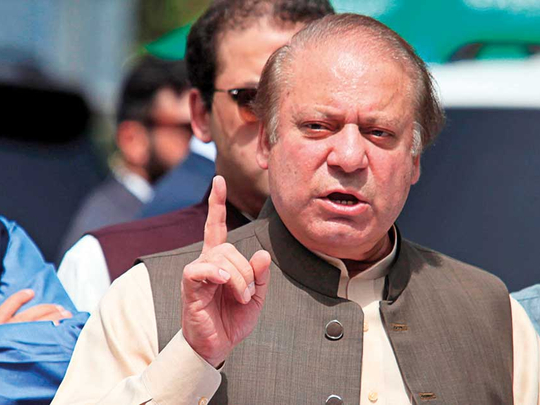
Pakistan Prime Minister Nawaz Sharif’s visit yesterday to the Ministry of Foreign affairs ostensibly for a briefing on foreign policy had more than just one hollow ring. Now in his fifth year as leader of the Islamic world’s only nuclear-armed state, Sharif has clearly ignored calls to appoint a full-time foreign minister, instead choosing to maintain a direct oversight. Consequently, the recurring question is: Is Pakistan’s present-day ruling structure capable of leading the country through its ongoing trials and tribulations?
Given the continuing turbulence in relations between Pakistan and its neighbours, notably India and Afghanistan, with added fallout from events in the Middle East, Islamabad’s full-time watch over foreign policy remains the responsibility of Sartaj Aziz, the prime minister’s 88-year-old foreign policy adviser, who happens to be more than just a octogenarian.
Yet, the happenings at Pakistan’s Foreign Ministry offer just a microcosmic view of the country’s overall direction under Sharif. In the past week, the unfortunate deaths of more than 150 people in an accident near Bahawalpur in the Punjab-Sharif’s home turf, finally prompted him to cut short a trip to the United Kingdom — though, conveniently, only after having spent the Eid day festivities at his family’s up-market and controversial apartments in central London.
His return followed three bloody terrorist attacks in Quetta and the northern city of Parachinar, which appeared to be of little consequence to force an interruption to Sharif’s Eid plans in London. On the face of it, the apparent difference was just one: Bahawalpur stands bang in the middle of Sharif’s political turf in Punjab, whereas Quetta and Parachinar clearly do not. And with elections looming in less than a year, its clear that the prime minister and his coterie of politicians have an eye on winning votes in 2018.
Sharif’s apparent complacency-stricken rule extends to other parts of government too, notably the economy, where providing basic human needs such as health care and education appear to have been overshadowed by an obsession with large and visible infrastructure projects. Meanwhile, Sharif faces a mounting challenge posed by the chance discovery of luxurious and exorbitantly expensive properties owned by his three children in central London.
Widely dubbed as the ‘Panama leaks’, the discovery came about in a set of documents leaked internationally, which documented vast amounts of wealth belonging to the high and mighty across the globe, including members of Pakistan’s ruling family. The investigations into the matter ordered by the Supreme Court under a high-powered Joint Investigation Team or JIT are set to resume. As the investigations continue, Sharif and his cohorts have missed no opportunity to cast doubts on the credibility of the process.
Ahead of the prime minister’s visit to the Foreign Ministry, one of his ministers claimed a ‘global’ conspiracy in the works to remove Sharif for his leadership role in undertaking the China-Pakistan Economic Corridor (CPEC) — an ambitious project to create a series of energy and infrastructure related initiatives in Pakistan. The minister additionally claimed that Sharif’s removal in a 1999 coup led by former General Pervez Musharraf was meant to punish the prime minister for overseeing Pakistan’s maiden nuclear tests of 1998.
Both statements couldn’t be any farther from the truth. China’s plan to launch the CPEC is widely known to have preceded Sharif becoming the Prime Minister in 2013. As for the 1998 nuclear tests, the credit must go to a range of actors, notably Pakistan’s army leaders rather than Sharif alone.
As for Pakistan’s future and that of Sharif, both remain unclear. Depending on the outcome of the JIT investigations and the Supreme Court’s subsequent stand, Sharif’s own future will likely be settled one way or the other. And yet, recent events have only proven the yawning gap surrounding Pakistan’s outlook that remains unaddressed.
With recent carnage in Quetta and Parachinar, its clear that Pakistan’s battle against militants is far from over. A powerfully telling reminder of the remaining gaps in this endeavour came earlier this year when Shoaib Suddle, one of Pakistan’s most well-respected former police chiefs, publicly lamented the government’s failure to take action on most of the areas named under a National Action Plan. The plan was once widely touted as the principal document to tackle a range of issues that together contribute to Pakistan’s security crisis. The failure to act is widely known to have come from a consistent failure by the ruling structure to go after some of Pakistan’s most well-entrenched interest groups. And with elections set to take place next year, its hard to imagine the future being any different from the past under Sharif’s rule.
Still, the hope for Pakistan’s future may ultimately lie with its people than one complacency-stricken ruling dispensation after another. Since last Thursday, reports of the havoc wreaked in the southern port city of Karachi after monsoon rains, were a powerful reminder of Pakistan’s continuing resilience. With the now all-too-familiar breakdown of electricity for hours at a time, graphic images of poverty-stricken neighbourhoods showed the inhabitants uniting to brave the challenges, such as pools of rain water blocking access to roads. Pakistanis have clearly learnt to live through one inconsequential set of rulers after another while leaders in Islamabad craft one conspiracy theory after another to save a complacency-stricken establishment.
Farhan Bokhari is a Pakistan-based commentator who writes on political and economic matters.










